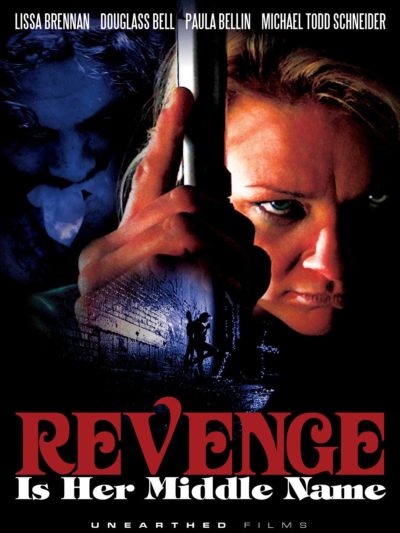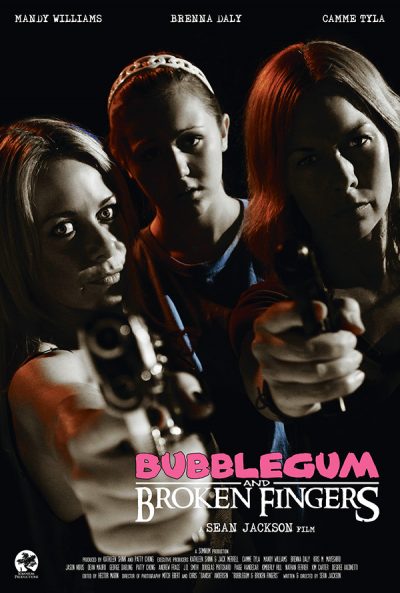½
“I know ninjas are supposed to be silent, but…”
 To a certain degree, this should be graded as “incomplete”. Easiest to quote the IMDb on the reason why. “This film was to be shelved by director Kabasinski, when post-production had a lengthy delay and he went on to produce the film Skull Forest. Very happy with the improvements in overall production value of Skull Forest, Kabasinski was going to just take this film as a ‘loss’ having already moved forward. It was not until an editor from Buffalo, NY stepped in and expressed desire in taking on the project. Feeling indebted to the cast and crew for the film and post-production going better then expected, Kabasinski decided on releasing the film.”
To a certain degree, this should be graded as “incomplete”. Easiest to quote the IMDb on the reason why. “This film was to be shelved by director Kabasinski, when post-production had a lengthy delay and he went on to produce the film Skull Forest. Very happy with the improvements in overall production value of Skull Forest, Kabasinski was going to just take this film as a ‘loss’ having already moved forward. It was not until an editor from Buffalo, NY stepped in and expressed desire in taking on the project. Feeling indebted to the cast and crew for the film and post-production going better then expected, Kabasinski decided on releasing the film.”
He shouldn’t have bothered. Because it does the Kabasinski brand-name irreparable damage, due to its terrible quality, in one aspect especially. If this had been fixed, it still wouldn’t have been great – it would remain cheap and amateur. But it would not be in the conversation for worst action heroine movie of all-time, as is the case based on what was eventually released. The story is about an assassin, known only as “The Lost One” (Porada), who is part of a sect of ninjas. On a mission, she balks when she is ordered to kidnap a child. This mutiny is not taken well, and she is left for dead by her colleagues. Naturally, she isn’t, and teams up with some Mafia hitmen (Anthony and Poffo) to get her revenge.
It’s a basic plot, yet not unworkable, especially when delivered with the director’s enthusiastic fondness for gratuitous nudity and gloopy violence. The low budget doesn’t really matter when you are talking nekkid ninja training. But what irredeemably sinks the movie, and why it should have remained lost (or, at best, a bonus feature on another movie) is the audio. Regular readers will know this is a common complaint I have with smaller productions, and it’s a personal peeve. I don’t use words like “worst ever” lightly either. So you will understand how much of an issue it is that – bold font, please – this is the worst ever audio I have heard on a released film, bar none.
Seriously, the audio is entirely missing for about half the scenes. No music, no background sounds, nothing. This includes the entire opening credits, which feature Mrs. Kabasinski doing more nude sword work. It almost becomes some bizarre form of art statement, like a throwback to the silent era. Even when it’s present, it is poorly mixed and the dialogue sometimes inaudible. It would probably have worked significantly better had Kabasinski nuked all the audio, turned it b&w, added some intertitles to tell us the plot, and thrown ninety minutes of public domain orchestral music onto it. Instead, what you have is a feature-length demonstration about the importance of the auditory portion to cinema. As well as how worthless a movie can be, when the makers simply cannot be bothered to deliver the materials.
Dir: Len Kabasinski
Star: Renee Porada, Brian Anthony, Lanny Poffo, Darian Caine





 As soon as I saw the running time of this was one hundred and thirty-one minutes, it immediately went onto the back-burner. I have a busy life, and I’ve going to devote close to two and a quarter hours to a low-budget movie, it is going to be when I have a
As soon as I saw the running time of this was one hundred and thirty-one minutes, it immediately went onto the back-burner. I have a busy life, and I’ve going to devote close to two and a quarter hours to a low-budget movie, it is going to be when I have a 


 Jesse (Finochio) is a Long Island cop on the edgeTM. Since losing custody of her kids, she has gone into a downward spiral of drinking, casual relationships and taking her anger out on any perps unfortunate enough to cross her path. She has driven her captain (Vario) to the edge of distraction, and is perpetually feuding with her mother and brother. The latter dies in a road accident – only his foot is found! – but when Jesse and Mom go to cash in his life insurance policy, they get a shock. The beneficiary has been changed to be Ralph Sirna (Trentacosta), a notorious local gangster. Suddenly, the accident seems rather less accidental, and nothing – not her boss nor Sirna’s “godfather”, Vince (Forsythe) – will be able to stop her.
Jesse (Finochio) is a Long Island cop on the edgeTM. Since losing custody of her kids, she has gone into a downward spiral of drinking, casual relationships and taking her anger out on any perps unfortunate enough to cross her path. She has driven her captain (Vario) to the edge of distraction, and is perpetually feuding with her mother and brother. The latter dies in a road accident – only his foot is found! – but when Jesse and Mom go to cash in his life insurance policy, they get a shock. The beneficiary has been changed to be Ralph Sirna (Trentacosta), a notorious local gangster. Suddenly, the accident seems rather less accidental, and nothing – not her boss nor Sirna’s “godfather”, Vince (Forsythe) – will be able to stop her. Wannabe actress Rosa (de Armas) is on the way home from her job as a hotel maid when she gets a message telling her she has a call-back the next day for a final audition. With her washing machine broken, she pops into the local 24-hour laundromat to get her costume all spick and span. It and the surrounding streets are completely deserted, and it’s not long before she’s being menaced by the kind of hulking, silent figure only found in horror movies like this. She’s delighted when hunky co-launderer Gabriel (Cadavid) shows up to rescue her, despite his strange tastes in music. But is he really as nice as he seems?
Wannabe actress Rosa (de Armas) is on the way home from her job as a hotel maid when she gets a message telling her she has a call-back the next day for a final audition. With her washing machine broken, she pops into the local 24-hour laundromat to get her costume all spick and span. It and the surrounding streets are completely deserted, and it’s not long before she’s being menaced by the kind of hulking, silent figure only found in horror movies like this. She’s delighted when hunky co-launderer Gabriel (Cadavid) shows up to rescue her, despite his strange tastes in music. But is he really as nice as he seems? Outside of Kill Bill, I’ve never been a fan of Quentin Tarantino. But this film did give me some appreciation for him. Because it’s only when you see Tarantino done badly, that you realize the aspects he does well. It undeniably takes some skills to keep a story-line involving multiple sets of characters in the air, especially when centered on a Macguffin like a suitcase whose contents are never revealed. Jackson tries to do exactly the same thing here, and the result is, frankly, a mess, where you’re left caring little or nothing about any of the participants.
Outside of Kill Bill, I’ve never been a fan of Quentin Tarantino. But this film did give me some appreciation for him. Because it’s only when you see Tarantino done badly, that you realize the aspects he does well. It undeniably takes some skills to keep a story-line involving multiple sets of characters in the air, especially when centered on a Macguffin like a suitcase whose contents are never revealed. Jackson tries to do exactly the same thing here, and the result is, frankly, a mess, where you’re left caring little or nothing about any of the participants. Pageants and drug cartels may not seem like topics that combine, but in South and Central America, they’re perhaps closer than you’d think. El Chapo’s third wife, Emma Coronel Aispuro, was a Mexican beauty queen. In 2013, the previous year’s winner of the “Sinaloa Woman” pageant, Maria Susana Flores, was killed in a clash with police.
Pageants and drug cartels may not seem like topics that combine, but in South and Central America, they’re perhaps closer than you’d think. El Chapo’s third wife, Emma Coronel Aispuro, was a Mexican beauty queen. In 2013, the previous year’s winner of the “Sinaloa Woman” pageant, Maria Susana Flores, was killed in a clash with police.  Maggie Marvel (Beretta) is a single mom, with all the issues that implies. She has to try and juggle work with raising young daughter, Samantha (Katherine Brennan), on her own. But complicating matters enormously, is that work in this case is operating as an assassin for criminal kingpin Dutch – who also happens to be Maggie’s estranged father, who sent her away after his wife (and thus, Maggie’s mother) tried to poison him. Maggie was raised instead by Dixie Brown (Barron), who also works for Dutch as a killer. For he believes women are better at the job, and though he employs men, such as Bobby Shea (Dan Brennan) and his brothers, they are kept for non-lethal work. However, this line gets blurred as Bobby has fallen for Dixie, and his request that Maggie work with him on a bank robbery – hoping to make Dixie jealous – kicks off a series of events that threaten to destroy Maggie, her family and the entire crime organization.
Maggie Marvel (Beretta) is a single mom, with all the issues that implies. She has to try and juggle work with raising young daughter, Samantha (Katherine Brennan), on her own. But complicating matters enormously, is that work in this case is operating as an assassin for criminal kingpin Dutch – who also happens to be Maggie’s estranged father, who sent her away after his wife (and thus, Maggie’s mother) tried to poison him. Maggie was raised instead by Dixie Brown (Barron), who also works for Dutch as a killer. For he believes women are better at the job, and though he employs men, such as Bobby Shea (Dan Brennan) and his brothers, they are kept for non-lethal work. However, this line gets blurred as Bobby has fallen for Dixie, and his request that Maggie work with him on a bank robbery – hoping to make Dixie jealous – kicks off a series of events that threaten to destroy Maggie, her family and the entire crime organization.